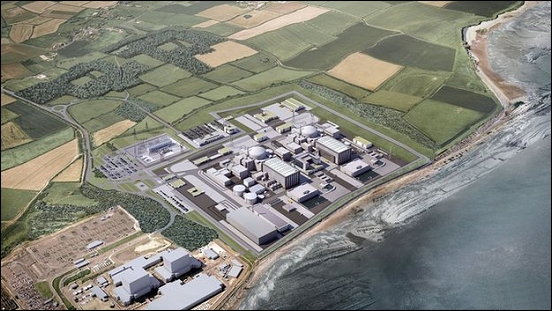A new £24.5bn nuclear power station at Hinkley Point near Burnham-On-Sea is to go ahead after it received final approval from European Union regulators.
The European Commission said on Wednesday (October 8th) that Britain had agreed to “modify significantly” the financing for the project, reducing the burden on British taxpayers.
In total 16 commissioners voted in favour of the project, just ahead of the 15 votes needed for approval.
EDF Energy is due to build the plant, which will be the first in the UK in almost 20 years.
The European Commission had been examining whether the funding for the project broke state aid rules.
However, it said the changes agreed by the British authorities would cut the subsidy by more than £1bn, meaning that state aid would remain “proportionate to the objective pursued, avoiding any undue distortions of competition”.
The Commission said these changes made meant gains generated by the project would be better shared with UK consumers.
Sedgemoor District Council welcomed the announcement. Leader of Council Duncan McGinty told Burnham-On-Sea.com: “Sedgemoor District Council is continuing to work closely with other local authorities in Somerset, EDF Energy and Government and is determined to maximise the positive economic benefits for local communities and businesses, as well as minimising the impacts from Hinkley Point C and its construction.”
Rupert Cox, CEO of the Somerset Chamber of Commerce, said: “The Somerset Chamber is delighted, but not surprised, that the EU has not objected to the Hinkley Point C development under its State Aid regulations. This is good news for EDF Energy and even better news for Somerset suppliers. This is another crucial step along the long road to the construction of Hinkley Point C, which will provide millions of pounds of worth of business for Somerset and South West businesses.”
But Stop Hinkley spokesperson Allan Jeffrey told Burnham-On-Sea.com: “This deal is clearly illegal under European law; it will saddle UK consumers with the bill for paying huge subsidies for decades, and yet there are more cost effective and safer ways of providing low carbon electricity or not using the energy in the first place. It is mind boggling how the UK government managed to convince the Commissioners to go along with this crazy plan without even the pretence of a competitive process.”
It estimated the project would now cost £24.5bn to build. The updated figure, much higher than the government and EDF’s original £16bn forecast, includes the impact of inflation as well as interest costs for the 10 year construction period.
This is the first time that the European Commission has approved significant state aid for a new nuclear power plant – and as such, it is a big step forward for the European nuclear industry.
The decision will serve as a precedent for other countries, such as Poland and the Czech Republic, that want to know how much public money they can offer to companies as they look to expand their nuclear industries.
But the legal fight over the funding for Hinkley Point C is almost certainly not over. The European Court of Justice will be asked for an opinion. Austria says the Commission’s decision is supported by neither economic nor ecological sense.
Other member states are also concerned that it flies in the face of the EU’s stated aim of promoting renewable energy sources, such as wind and solar.
The government had already agreed that French firm EDF will be paid a so-called “strike price” of £92.50 for every megawatt hour of energy Hinkley C generates. This is almost twice the current wholesale cost of electricity, but this was a deliberate attempt by the government to compensate for the high cost of building the plant.
However, the Commission said that if EDF’s overall profits exceeded the rate estimated at the time it was awarded the contract, any gains would be shared with the public.
It said it had also defined a second, higher threshold above which the public would be given more than half of the gains, through lowering the cost of the “strike price”.
“An increase in the profit rate of only one percentage point, for example, will generate savings of more than £1.2bn,” it said.
It said this agreement would now last for the entire lifetime of the project – an estimated 60 years.
“These modifications will also achieve significant savings for UK taxpayers. On this basis and after a thorough investigation, the Commission can now conclude that the support is compatible with EU state aid rules,” said Commission Vice-President Joaquin Almunia.
The two reactors planned for Hinkley near Burnham-On-Sea, which will provide power for about 60 years, are a key part of the coalition’s drive to shift the UK away from fossil fuels towards low-carbon power.
The nuclear power station is expected to begin operating in 2023. The government estimated last year that with new nuclear power – including Hinkley – the average energy bill in 2030 will be £77 lower than it would have been without the new plants.
The decision was controversial, with green critics believing that the government should have offered subsidies to renewable energy sources, such as wind and solar energy.







